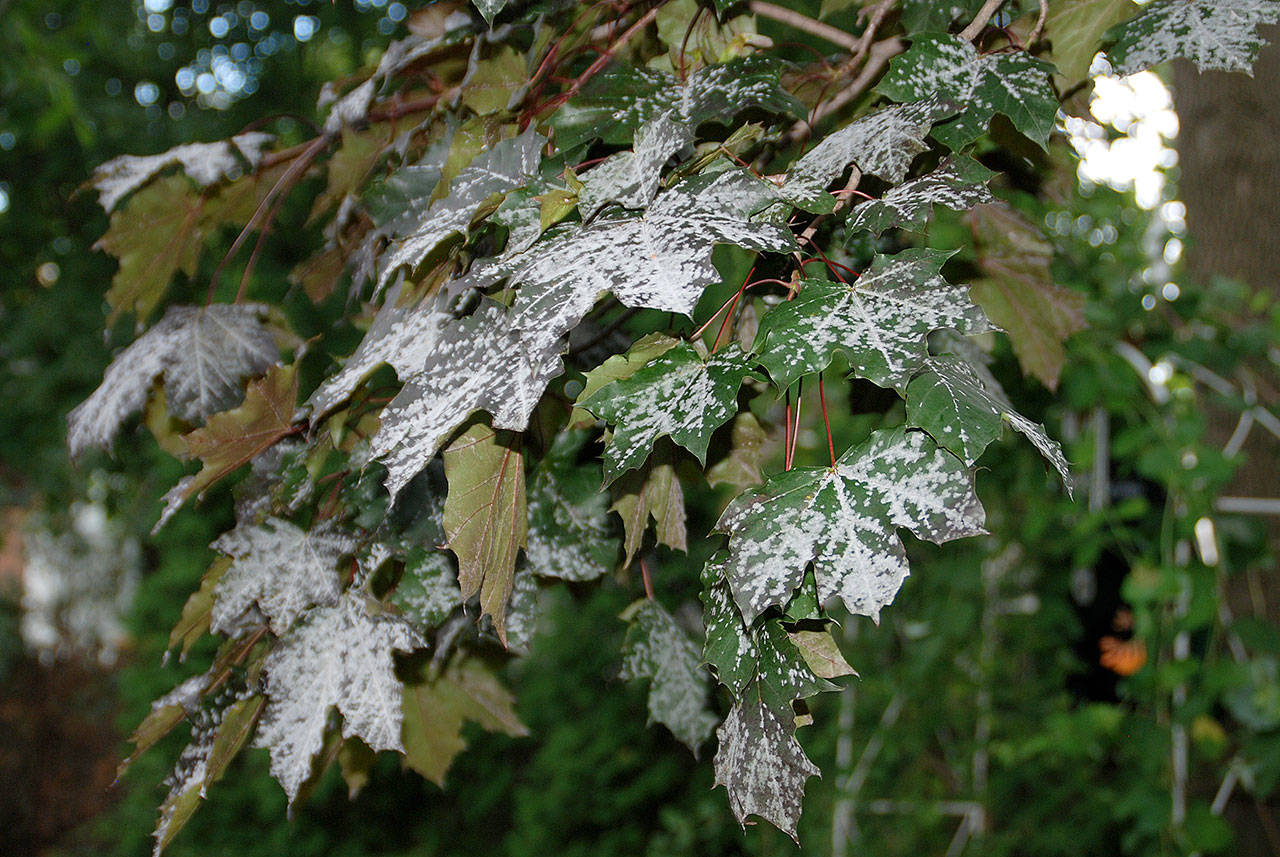By Melinda Myers / Special to the Herald
Spots and patches of a white or gray talcum powder-like substance on your plant means powdery mildew infected your plant.
This is one of the most widespread fungal diseases and attacks a wide range of plants. You may see mildew on a variety of trees, shrubs, flowers, vegetables and lawn grasses. Don’t despair — you can reduce the risk of this disease with proper plant selection, maintenance and, if needed, organic intervention.
Which plants are common victims of powdery mildew in the Northwest? Unfortunately, Rick Peterson, Great Plant Picks’ education and events manager, said there’s a long list of them.
“A wide range of native and exotic plants get powdery mildew in the Puget Sound region,” said Peterson, who is a master gardener. “Many older varieties of hybrid tea roses, phlox, apple and pear trees, cucumbers, squash, pumpkins, deciduous azaleas and our native big-leaf maple (fall victim), to name just a few.”
Powdery mildew is most common during hot dry weather. Wet foliage does not increase the risk of this disease, but high humidity does. You’ll typically see more mildew problems in crowded plantings, damp and shady locations as well as areas with poor air circulation.
Powdery mildew, like other diseases, occurs when the fungal organism and susceptible plants are present together and the environmental conditions are right for the disease to occur. Remove one of these factors and you eliminate the disease. You can’t change the weather but there are some things you can do to reduce the risk of powdery mildew.
Avoid purchasing mildew susceptible plants. Instead select disease-resistant varieties whenever possible. Fortunately, many new varieties of phlox, bee balm, lilacs and other mildew-resistant plants are now available at your favorite garden center.
Further decrease the risk by growing plants at the recommended spacing in the preferred amount of sunlight. Giving plants room to reach full size ensures they will receive sufficient sunlight and air circulation, thus reducing the risk of this and other diseases. Your plants will be healthier and better looking when they have space to show off their beauty.
Thin susceptible varieties of perennial plantings like phlox and bee balm in spring as new growth emerges. Removing one fourth of the stems increases light penetration and airflow reducing the risk of powdery mildew. Grow vine crops like cucumbers and squash on trellises and fences to accomplish the same results. Support large fruits of squash and melons with cloth slings anchored to the trellis.
Avoid excessive nitrogen fertilization that encourages lush succulent growth that is more susceptible to this and other diseases and many insect problems. Consider using low-nitrogen, slow-release fertilizers that promote slow, steady growth above and below ground.
If mildew continues to be a problem and is impacting the health and beauty of your plants, you may decide to intervene. Lightweight horticultural oils trap the fungal spores on the plant preventing it from spreading. Select certified-organic products that are approved for organic gardeners.
Always read and follow label directions of all chemicals, organic or synthetic, before applying to any plant. Thorough coverage of the upper and lower leaf surfaces and stems will improve your success rate.
Check plant tags, purchase wisely and adjust plant maintenance to reduce powdery mildew problems in your landscape. A bit of prevention and proper care go a long way to reducing the time spent maintaining healthy, productive and beautiful gardens and landscapes.
Melinda Myers has written more than 20 gardening books, including “Small Space Gardening.” She hosts The Great Courses “How to Grow Anything” DVD series and the nationally syndicated Melinda’s Garden Moment TV and radio segments. Myers is a columnist and contributing editor for Birds & Blooms magazine. Her website is www.melindamyers.com.
Talk to us
> Give us your news tips.
> Send us a letter to the editor.
> More Herald contact information.

























